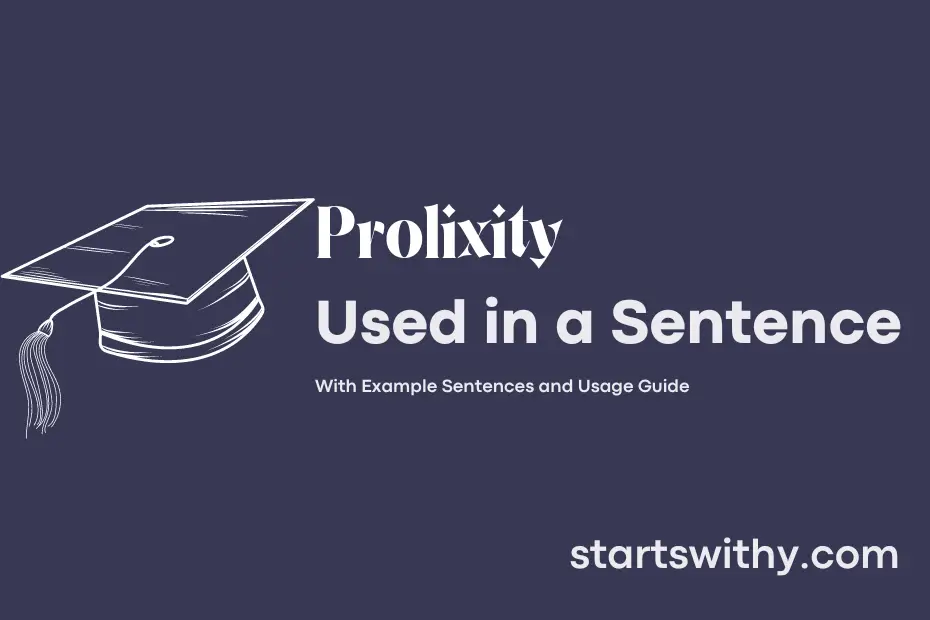“Prolixity” refers to using an excessive amount of words to convey an idea, often resulting in long-winded, tedious passages. This term is frequently used to describe writing or speech that is unnecessarily verbose and overly detailed.
In communication, prolixity can hinder clarity, making it challenging for the audience to grasp the main points effectively. It is essential to strive for concise and precise language to ensure that one’s message is conveyed clearly and efficiently.
7 Examples Of Prolixity Used In a Sentence For Kids
- Prolixity means using too many words to say something.
- Let’s practice using simple words and avoiding prolixity.
- It’s important to keep our sentences short and clear, without prolixity.
- Too much prolixity can make it hard for others to understand us.
- Remember, we should always try to express ourselves without prolixity.
- Using big words and prolixity can make our message confusing.
- With practice, we can learn to communicate effectively without prolixity.
14 Sentences with Prolixity Examples
- The professor’s prolixity during lectures often makes it difficult to take concise notes.
- To avoid prolixity in your research paper, focus on presenting your arguments in a clear and concise manner.
- I struggle to keep up with the prolixity of the readings assigned for my literature class.
- The student’s essay was marked down for its unnecessary prolixity and lack of clear, direct points.
- When studying for exams, it’s important to summarize your notes to avoid unnecessary prolixity.
- The lecturer’s tendency towards prolixity meant that the class often ran longer than scheduled.
- Students should aim to communicate their ideas effectively without falling into the trap of prolixity.
- The textbook’s heavy prolixity made it challenging for students to grasp the main concepts.
- Learning to edit your writing can help you spot and eliminate instances of prolixity.
- Avoiding prolixity in your presentations can help you communicate your points more effectively.
- The professor encouraged students to be mindful of prolixity when constructing their arguments.
- The student’s essay was criticized for its excessive prolixity and lack of focus.
- Effective communication in group projects requires clarity and coherence, steering clear of unnecessary prolixity.
- During group discussions, it’s important to listen actively and avoid unnecessary prolixity when expressing your thoughts.
How To Use Prolixity in Sentences?
Prolixity is a noun that refers to using an excess of words when speaking or writing, often resulting in verbosity or long-windedness.
To use Prolixity in a sentence, start your sentence with a clear subject, followed by an action or description. Insert the word “Prolixity” in the appropriate place to demonstrate an understanding of its meaning. For example: “Her lengthy and overly detailed explanation was a clear example of Prolixity.”
When incorporating Prolixity into your writing or speech, ensure that it fits naturally within the context. Avoid using it excessively or unnecessarily to prevent coming across as verbose yourself. It’s essential to strike a balance between clarity and detail in communication.
Remember that Prolixity is a formal term often used in academic or professional settings to critique or describe lengthy or wordy passages. Attempt to use it in the appropriate context to enhance your vocabulary and effectively communicate your ideas.
Overall, practicing the usage of Prolixity in sentences will help you become more familiar with the term and improve your ability to identify and address verbosity in your own writing or speech.
Conclusion
In writing, prolixity refers to unnecessarily long and wordy sentences that can hinder clarity and impact. These verbose sentences lack conciseness, leading to reader confusion or disinterest. For example, “His prolixity in speeches made it challenging for listeners to grasp his main points quickly.”
To avoid prolixity, writers should strive for clarity by using simple and direct language, breaking down complex ideas into digestible chunks, and eliminating unnecessary words or repetitions. By tightening up sentences and being mindful of the reader’s understanding, writers can effectively communicate their message without the burden of prolixity.



